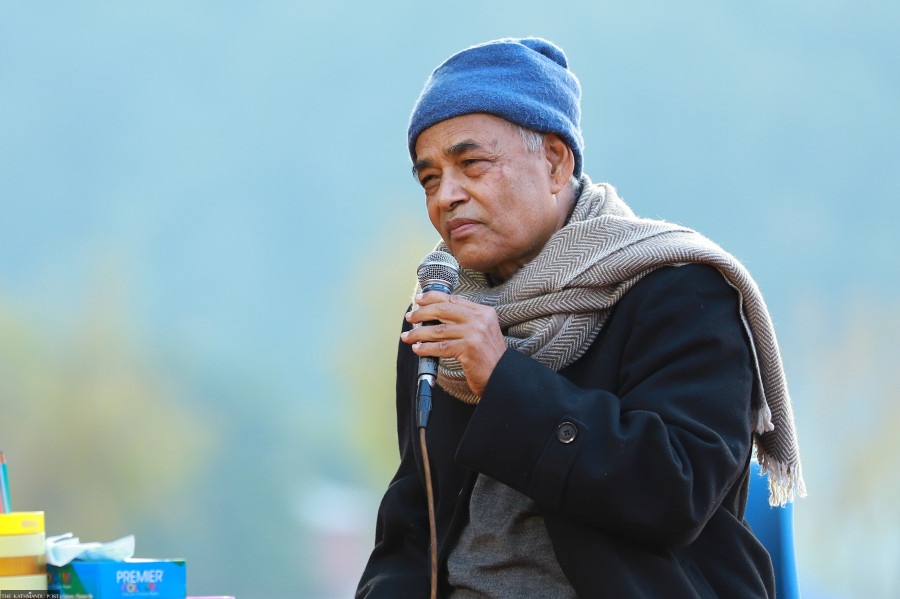National
An interpreter of maladies
Pradip Giri was a quintessential Nepali public intellectual who interpreted to us our desires, miseries, hypocrisies.
Dinesh Kafle
In the contemporary Nepali political sphere that usually reeks of moral turpitude and ideological penury, if there was any politician who resembled a distant cousin of Plato’s philosopher-king, it was Pradip Giri. The politician-philosopher who transcended ideological boundaries to become the most convincing interpreter of the maladies that imperil Nepali society and politics died on Saturday. He was 74.
Giri leaves behind a legacy of over five decades of engagement with political activism and participatory democracy. Most of all, Giri leaves behind a legion of followers across ideological boundaries who respected him for his wit and erudition, if not a political vocation.
If discussing life, literature, politics and society was not enough, journalists and intellectuals alike harboured dreams of—and on occasions, some even succeeded at—interpreting death and the afterlife with him. As his struggle with death came to light in the last few weeks of his life, media platforms became inundated with wishes for his recovery. But if there were anyone who could have taken his death as the most natural and inevitable event of his life, it would be Giri himself. A politician-philosopher who could explain Western political philosophy and Eastern mythology with equal ease, Giri was peerless in his intellectual prowess among Nepal’s politician-intellectuals.
As he grew older, his baritone voice grew ever more calmer—he had attained the reassuring aura of a patriarch who would enchant youngsters with mythical stories and impart in us the moral courage to live an examined life. His speeches were rich with anecdotes and philosophical inquiry into mythological characters, including the Mahabharata and the Ramayana, and catered to the youth who are otherwise often disinterested in the speeches of politicians.
Among Nepal’s politicians, he had no parallel within his party, the Nepali Congress, or outside when it came to linking contemporary political events with historical antecedents and premonitions for the future. He was, in fact, the only leader who came close to matching the intellectual legacy of Bishweshwar Prasad Koirala, the founder and ideological preceptor of the party. But it was always well-known that he had the intellectual aura of a philosopher, not the shrewdness of a politician of our times.
In his party, he was at most an ideological guru for the rebellious fringe, with little influence in its machinations. Chided by the party’s mainstream Koirala faction, he even sided with Sher Bahadur Deuba during crucial junctures. He was infamous for his long, inexplicable absences from Parliament, but when he visited it and spoke during parliamentary sessions, it was impossible to ignore the passion he would demonstrate for the rights of the people, especially the oppressed and the marginalised, and the future of democracy.
Did he live up to the same ideals that he professed in his public discourses, private conversations and parliamentary speeches? It is not for anyone except him to answer this question authoritatively. It is not entirely possible for a mortal human to live the virtuous and righteous life that one preaches. Each righteous person lives with inherent contradictions. Perhaps those who had a long engagement with him will be able to shed some light on the conformities or contradictions in his ideas of life and the way he lived it. But as Giri would perhaps agree, even the closest of our relatives, friends, lovers or enemies understand a fraction of what we are for real.
Each individual who has ever been close to him may have different stories to tell about him, just as those of us who did not know him personally have our own reasons to admire or criticise his vocation as a politician and public intellectual. It is only in bits and pieces that we live in the hearts and minds of other people.
While speaking about a person like Giri who emanated immense intellectual aura and moral courage, one always runs the risk of slipping into a hagiographic description.
For, each day of our lives, we have been looking for a hero who will come and save us from our miseries. That hero, we hope, will at least tell us about how messed up our lives are. But he would certainly disapprove of such desires and would refuse to be raised on a higher pedestal than his fellow mortals.
In that sense, Giri, if he could not rescue us from our miserable lives, spoke with us; he explained the world to us in a way that we understood it in a larger historical context, and that made us intellectually richer. We derived pleasure and pain in equal measure from his interpretations of our lives. He was a quintessential Nepali public intellectual who explained to us our desires, miseries and hypocrisies. Importantly, he reinforced in the Nepali public sphere the Socratic dictum that an unexamined life is not worth living.
As a mortal being, Giri was a person with all the human qualities of empathy, anger and cardinal desires. Any attempt at his deification may lead to a misrepresentation of the human being that he was. What was perhaps slightly different in him from many of his fellow compatriots was that he lived an examined life in the Socratic vein, aware of what makes life worth living. What goes without question is that he made Nepal's public space a notch better, and for that, we should all be indebted.




 22.64°C Kathmandu
22.64°C Kathmandu












